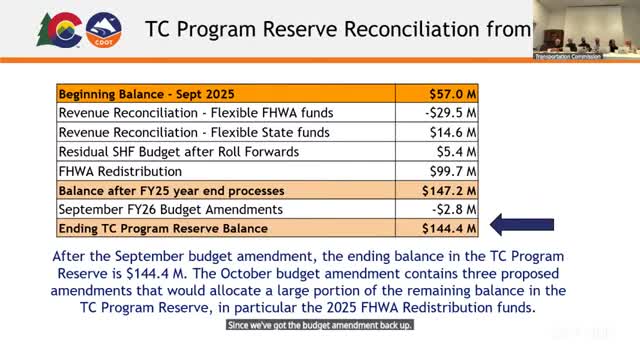CDOT proposes $97.3 million in FY26 amendments, including $80 million for pavement
Get AI-powered insights, summaries, and transcripts
Subscribe
Summary
At a Transportation Commission budget workshop, CDOT staff proposed three fiscal year 2026 budget amendments: about $80 million for pavement projects, $16.2 million to restore maintenance levels of service, and $1.1 million returned to Region 4 for a delayed striping project. Commissioners were asked for feedback and staff will return in November
Colorado Department of Transportation staff on Oct. 16 outlined a proposed amendment to the current fiscal year 2026 budget that would allocate roughly $80 million in federal redistribution dollars to pavement projects, set aside $16.2 million in state funds for maintenance levels of service and restore $1.1 million inadvertently returned from Region 4.
In presenting the proposal, a CDOT staff member identified in the meeting as Jeff said, “We are proposing 3 amendments this month … the first … is a request to allocate about $80,000,000 from, to supplemental funding for pavement condition. The second … is a request to set aside about 16,000,000, in additional funding for the current fiscal year maintenance levels of service budget. And the fourth is a … request from Region 4, to restore 1,100,000.0 in funding.”
Why it matters: CDOT said the pavement allocation would use federal redistribution dollars that must be put back into the federal reimbursement pipeline quickly; pavement projects are straightforward to scope and spend and therefore suitable for fast federal reimbursement. The department also said maintenance work is generally not eligible for federal funds and the maintenance budget is currently short by an estimated $16–19 million for FY26.
Details and context: CDOT described the $80 million as federal redistribution funding identified during the department’s revenue-reconciliation process. Staff said regions are preparing lists of additional pavement projects focused on the worst-rated road segments, including rural roads with very low drivability indices. “We’re talking about roads that are rated, with a drivability life, close to 0, or 0,” Jeff said.
Regarding the $16.2 million maintenance request, staff said that maintenance activities—things such as overtime and small crew repairs—are funded with limited state dollars and are ineligible for the federal capital funds CDOT plans to use for the pavement work. “Maintenance isn’t eligible for federal funding … we have 1 of our challenges in adequate funding maintenance,” Jeff said. He added that approving the allocation would reduce the need to draw on operating budgets to pay for personal services and special pay.
On the $1.1 million Region 4 request, staff said the money was returned to the program reserve after a striping project was delayed and the region had intended to request a roll forward. Restoring that amount would avoid the region having to use its current-year maintenance budget to complete the delayed striping work.
Process and next steps: Commissioners did not vote on the amendment package at the workshop. Jeff said staff would take commissioners’ feedback and return in November with a formal request for approval. “We’re not gonna do that here, given just the size of the budget amendment … we will return in November, and request approval in November,” Jeff told the commission.
Questions from commissioners and staff responses: Commissioners asked about the geographic split between interstate and rural roads for the $80 million. Regional staff member Keith said the list is still under development and that the allocation would likely be “more heavy on the rural side, rather than the interstates.” Another commissioner asked how to advocate for a specific road; staff advised contacting the regional transportation director for that corridor.
Ending: Staff stressed they would return next month with the formal amendment resolution and a project list for the pavement dollars. The commission did not act on the amendment package on Oct. 16.
